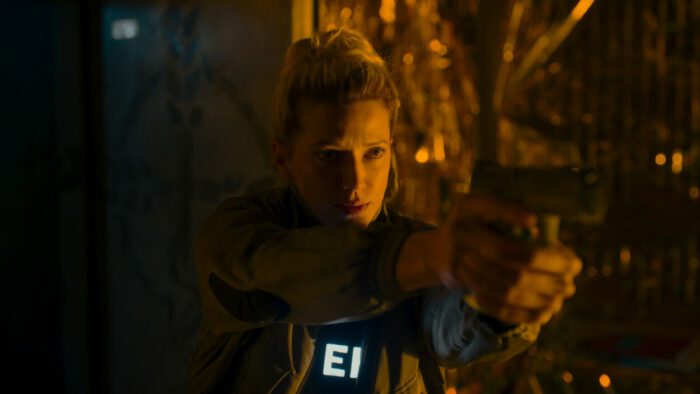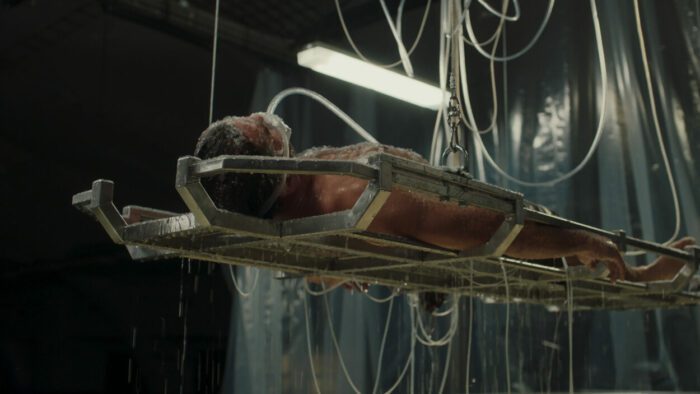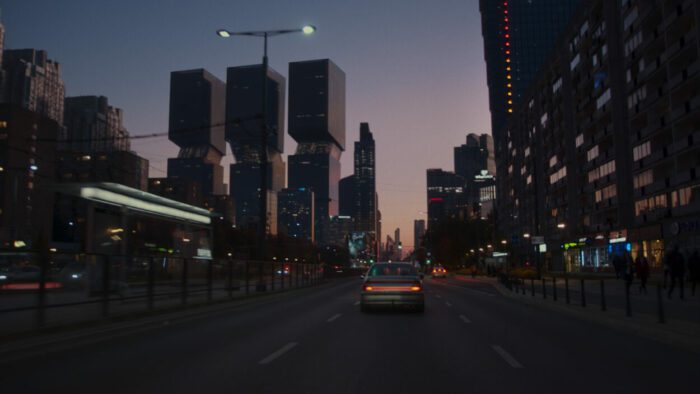Steller premises have jolted science fiction films to life time and again. Having an intriguing one brings interested eyes and eager ears. The Czech import Restore Point from XYZ Films has a doozy that kicks strongly. Set in central Europe in the year 2041, society is advancing beyond long-standing social and economic inequity by way of a government-subsidized second chance at life. All citizens are afforded the constitutional right to be revived in the event of an unnatural death thanks to a medical procedure using a data backup of one’s brain saved every two days. Aptly so, the technology is called Restore Point and, yes, I can hear your Microsoft Windows jokes from here.
Now, a premise like that will only get a film so far. Ideas are cool, but they need more expanse to really mature. Solid screenplays creating potent implications or gripping conflicts must execute that demand. Restore Point lays out such boosts, but drives more around the bigger picture rather than through it. Be that as it may, the intriguing neo-noir mystery at its core remains worth the effort and attention you can give.

Operating in this world of extended mortality, Restore Point stays at the holstered side of Detective Em Trochinowska (TV actress Andrea Mohylova in her first feature). With a stern preference to work alone and ignore authority, she has been tracking crimes perpetrated by the “River of Life” terrorist group. Her curtness for protocol and icy exterior come from losing her musician husband several years ago to a River of Life bombing at a concert. The vendetta vibes are strong and her commanding officer (Jan Vlasák of Hostel and The Red Baron) knows it.
Granted, this woman is most certainly not a trigger-happy cop stereotype shooting first and asking questions later. It’s quite the opposite in fact. She’ll surely draw her weapon and stare someone down. But like a quarterback holding the ball too long in the backfield to the point of getting sacked, Em hesitates and allows too many collars to get away. As one peer tells her sternly, shoot or arrest. Period. She will be forced to rectify that in Restore Point. Mohylova performs her path with tactical grit and emotional strength as a compelling lead to follow.

Detective Trochinowska’s latest case of absolute murder is the suspicious killing of high-level Restore Point executive David Kurlstat (Matej Hádek of The Snake Brothers) and his wife Kristina (Katarzyna Zawadzka of the Mecenas Porada TV series) who were targeted for their computer access into Restore Point data archives. Initial findings put Em on the trail of Viktor Toffer (Let There Be Light’s Milan Ondrík), a man with River of Life ties. The investigation takes a severe turn when a secretly-restored David approaches Em for protection and answers to his own murder.
River of Life has been killing people with expired backups to stoke fear. Their efforts are accelerating public favor towards Restore Point’s desire to privatize their company to provide new, immediate backups in real-time for supposedly economical prices. River of Life has boldly pressed forward with a new computer virus running rampant to erase public backups by the thousands an hour, risking the entire nation of citizens. Restore Point’s founder Mr. Rohan (Karel Dobrý of Mission: Impossible and A Knight’s Tale) argues the bureaucratic system saves lives, but hides this new development to avoid public panic. On the opposite side, River of Life claims the corporation is preying on fears of mortality and reversing natural fate. The farther Em pursues Viktor and breaks the rules to do it, the more Em questions the value of the side she and law enforcement are protecting.

Restore Point impressively looks the part of a futuristic neo-noir without sensory overload or distracting incoherence of having cinematographer making things look busy or shiny for the sake of simply looking busy or shiny. Digital architecture created by VFX supervisor Michal Krecek and his artists is seamlessly inserted in foregrounds and matted backgrounds to merge and thicken the location shooting locations. The prop gadgetry sleekly manufactured a few clever MacGuffin items that carry portable importance. All of this looks outstanding in Restore Point for a budget equivalent to a single million American dollars.
Maybe it’s due to budget constraints or maybe not, but the film left some ambition on the screenplay treatment page. Charting conspiracies reverberated turn after turn by a strong electronic musical score from first-time feature composer Jane Sleska, Restore Point speaks of the wider risks of potential societal collapse without thrusting viewers into that next sphere of trepidation. The implications of either freeing everyone or dooming everyone could have been a big pendulum to swing above the cop’s linchpin case, but the crumbling walls are too far away to alarmingly see or feel. So, in that regard, a little overarching suspense is lost while the film sticks to its gumshoe path instead. If director Robert Hloz (also completing his first feature) and his fellow writers knew such an escalation was too big to fathom or accomplish, we can respect that self-control and the resulting grizzled approach where the simmering excitement still performs well.



